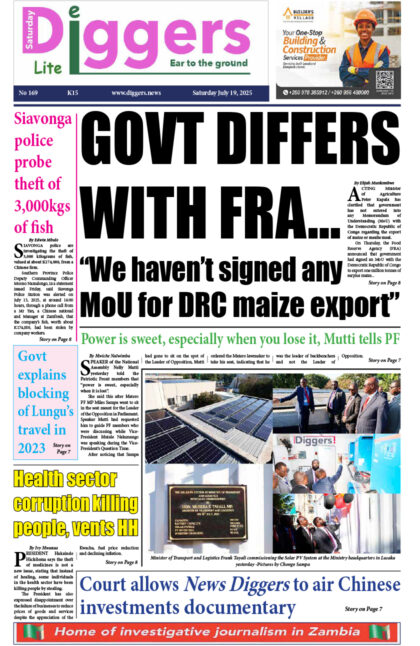There were good reasons why the founding fathers of our nation decided to introduce the national motto of “one Zambia, one nation” at the time of independence in October, 1964. They recognised that it was critically important for the 73 tribes of Zambia to live together in peace and harmony, regardless of where they came from.
At that time, our founding President Dr Kenneth Kaunda and his government adopted a policy of sending public servants to work in provinces, other than where they originated from, to give them a sense of appreciation of other ethnic groups as well as their rich cultures. This policy worked well and achieved the desired results in that public servants were able to speak different local languages thereby widening and enhancing ethnic diversity.
Like all important national issues, there were challenges caused mainly by politicians. In 1967 during the UNIP national conference at Mulungushi Rock, open tribal alliances emerged which infuriated President Kaunda resulting in tension, not just in UNIP, but also in government. Things were not made easier in early 1968 at the UNIP national council meeting in Chilenje, where some of the left-overs from Mulungushi Rock showed their ugly heads yet again, prompting President Kaunda to storm out of the national council meeting one evening and announcing his resignation as both President of UNIP and President of Zambia, stating that he was not prepared to lead a nation of tribalists, that did not believe, let alone practice the motto of “one Zambia, one nation”.
After the political turbulence caused by Simon Kapwepwe’s resignation from UNIP and its government, where he stated a cause, that certain ethnic groups were being excluded from governance and power sharing on grounds of ethnicity, again President Kaunda stood firm and pointed to the ethnic diversity of his government, appointments in Cabinet, civil service, parastatals and the foreign service, which were a matter of public record.
What has gone wrong and why is the subject of tribalism rearing its ugly head in 2017? Is there a lack of commitment to the national motto of “one Zambia, one nation” on the part of the current leadership? Is Cabinet representative of all parts of Zambia? Are civil service, parastatal, foreign service appointments representative of the Zambia we want? Sadly, the answer is no.
Politics has taken over every facet of our national life, where everything is being looked at either in political or ethnic tinted glass. It is not unusual for people being considered for appointment into government, government boards or the Foreign Service to be asked: “to which party do you belong?” Reports abound of civil servants and other professionals being purged from government institutions on account of their ethnic belonging or being retired using the old tired cliché of “in the national interest “. There has been no robust denial of these reports. Is this the Zambia we want or deserve? The answer is an energetic no!
One only has to look at our politics and voting patterns in the recent past and how deeply divided we have become as a nation. The tendency to point accusing fingers at only one political party is unhelpful and unproductive, because all the major political parties are to blame. Statistics don’t lie and are there to support this statements. What is the difference between southerners consistently voting for one party and northerners doing the same?
Our political leaders and certain sections of the media should deeply reflect on this disturbing pattern which was not there during the first, second and the early part of the third republics. The absence of dialogue among our political leaders is a disgrace and plants seeds of disunity and potential cultural violence, which we can do without in our country. We used to sit down in closed session before and speak to each other as leaders candidly and even disagree without being disagreeable or nasty. It should not be “them” and “us”, because Zambia belongs to all of us and not to any privileged few. Our leaders should put Zambia first and learn the majesty and efficacy of dialogue.



















One Response
The revisionist rhetoric of VJ Mwaanga has gone unchallenged for far too long. Mr Mwaanga insists that tribalism didn’t exist in Zambian politics until recently. This is patently absurd. The results of the elections in 1962, 64, and 68 showed almost the exact tribal breakdown in voting patterns as exists today. In fact, the main reason why the dictator-in-all-but-name Kenneth Kaunda imposed the One Party State was his fear of the Bemba-dominated UPP and Tonga-dominated ANC, which together controlled 70% of the electorate. Please VJ, enough already. You are doing a grave disservice to the youth of Zambia with your revisionist history.